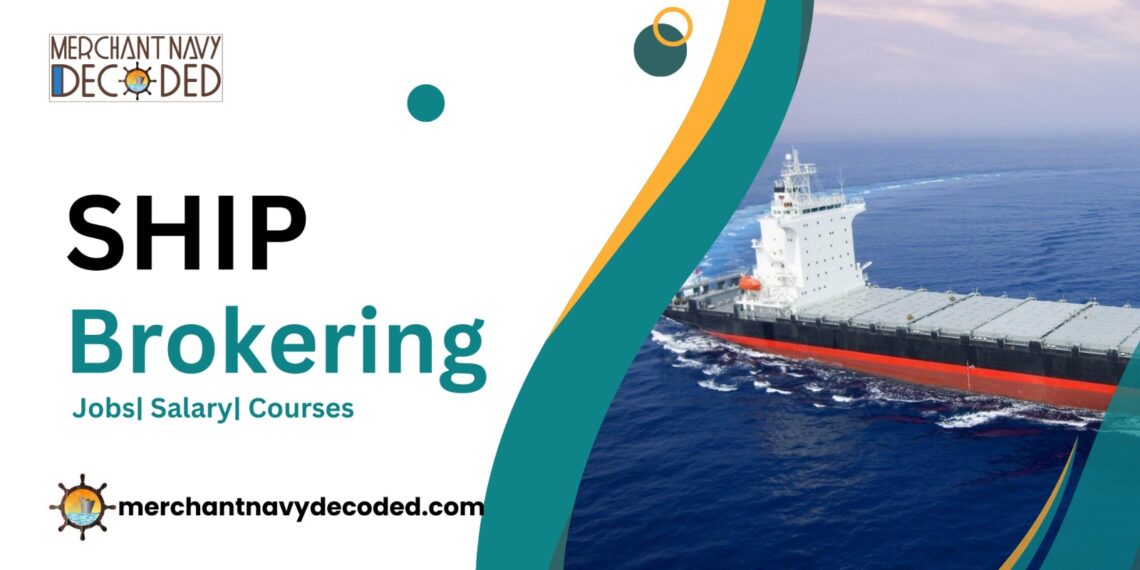Ship Brokering |A Complete Guide for Ship Brokering
Ship Brokering Overview
In Ship Brokering, a professional works as a mediator or intermediary between two parties and the parties are ship owners and ship charterers. It involves facilitating the buying, selling, or chartering of the ships or vessels. The broker helps the potential buyer or the ship owners negotiate the deals, finalize contracts, and smooth transactions between both parties involved.
1:- Types of Ship Broker
Ship Brokering in the maritime industry is a way of connecting maritime stakeholders by buying, selling, or chartering vessels with the broker’s help. They ensure the finalization of contracts and deals. Shipbrokers have many categories the buyers can contact to the one required as per their need. They make money from the transactions between the buyer and seller. There are many duties of a ship broker and they need to have some specific skills to be a ship broker.
There are many categories of shipbrokers such as:
- Sale and purchase Broker
- Gas Carrier Broker
- Container Broker
- Offshore Broker
- Dry Bulk Carrier
2:- Ship Broker Job
The shipbroker job is associated with the different types of ship brokering such as:
2.1:- Sale and purchase Brokers
- Market Analysis: To analyze the condition of the market and the factors it depends upon.
- Negotiations: To negotiate between the buyer and seller to get them into favorable terms.
- Vessel Assessment: To get the accurate specification of the vessel and give it to the clients.
- Documentation: To ensure the preparation and completion of the documents required for the purchase of that vessel.
- Proper transaction: Ensuring the whole transaction process is smooth and without interruptions.
2.2:- Newbuilding Brokers
- Quality: Providing the client with the required quality standards and addressing the issues that arise during the construction.
- Communication: staying in touch with the shipyard to ease the process of construction.
- Management of Timeline: Making sure and managing the timeline provided for the construction of the vessel and delivering it on time.
- Delivery: Delivering the vessel to the owner on time after its construction.
2.3:- Chartering Broker
- Market analysis: Having the information on the market, its demands, and the availability of the vessel and the cargo traders.
- Good Connections: Connecting in the maritime industry with the charters and the ship brokers to initiate deals or transactions.
- Negotiations skills: To get both the ship owner and the charter on favorable terms that will benefit both of them.
- Documentations: Managing the documents required for the agreement to ensure safety and reduce the chances of any dispute or issues.
3:- How to Become a Ship Broker.
- To become a ship broker, you need to have a combination of education, communication skills, knowledge about the industry, and professional networking.
- Having an educational background is optional, but a relevant degree in the maritime sector will help.
3.1:- Eligibility criteria to become a Ship Broker
The eligibility criteria to become a ship broker vary depending on the company, region, and the requirements of the job. There are no specific eligibility criteria to become a ship broker but possessing a set of skills and a combination of education, knowledge of the industry, and experience, will help you to succeed in the career of ship brokering.
These are characteristics and qualifications that one should acquire :
- To become a ship broker the candidate has to be at least 18 years old.
- A specific degree is not required but it is preferred to have a background in maritime studies, business, logistics, or a degree related to the field.
- A strong understanding of the maritime industry, types of vessels, handling of the cargo, and shipping regulations is essential.
- A ship broker must possess good communication skills and negotiation skills, to build relationships with clients, and to convey information and details.
- Sales and marketing skills are essential and very highly beneficial for shipbrokers. They are tasked with marketing the available vessels to potential buyers.
- Negotiating favorable terms for both parties and ensuring a smooth transaction.
3.2:- Steps to Become a Ship Broker
- Complete a Bachelor’s degree
A degree in the maritime sector will provide an understanding of the maritime industry, maritime law, and international trade, and the required skills and knowledge for the job or the individual can go for a bachelor’s degree in business and finance, it’ll help you to gain knowledge about the financial principles of the shipping industry. That’ll work as an advantage for the individual if you want to join a firm.
- Join a Shipping Company
By joining a shipping company you will gain experience. This will help you to understand the different aspects involved in the shipping. Through this, you can learn about many things that will greatly help you, with your potential clients and business deals.
- Clearing the Institute of Chartered Shipbrokers(ICS) exam
To become a chartered broker you have to clear a series of exams. It includes 3 exams and the candidate has to clear all three exams.
- Fundamental Maritime Law(FML) is the first exam.
- The second exam is the International Shipping Business Practice exam.
- The third exam is Company Law Part 1.
4:- How to Become a Shipbroker from Seafarer?
After being a seafarer for a while the individual will have an advantage, technical knowledge will help you because companies and firms want a candidate who has technical knowledge about the industry.
Here are some steps that you can follow to become a shipbroker from seafarer:
- Enrolling in a short program such as the Executive Maritime Management Program will be equivalent to a graduation degree. Pursuing these programs will help you gain an understanding.
- If you are sailing onboard you can enroll in programs specifically for the mariners.
- After completing the courses you can enroll for Post Graduation such as MBA or M.Sc degree.
- There are options for a Foundation Diploma and Advanced Diploma.
- Get in touch with companies and join as an executive.
For more clarity, you can have a look at the free series which is a guidance series for Ship Chartering and Ship Brokering
5:- Skills Required to be a Ship Broker
To become a ship broker the individual needs to have a combination of skills that include many factors such as good communication skills, and knowledge of the market.
The skills one should acquire to become a ship broker are:
- Communication skills: This is the most required skill to have. It involves active listening, being vigilant with your words, being able to express your thoughts properly, and maintaining transparency throughout the conversation.
- Market Analysis: Knowing the market and its status is very necessary, including the trends and the whereabouts of what is happening in the market and what are the perspectives or reports of other people.
- Networking: Making good connections in the maritime industry is very crucial to succeed in this industry, to get clients, and to expand your business. The ability to connect with ship owners, charter, and other professionals in the industry will open doors to new opportunities.
- Being unbiased: it is very essential to be transparent and not take anyone’s side while doing a transaction. You’ve to be unbiased so that the transaction happens smoothly.
- Negotiating skills: You need to acquire negotiating skills to negotiate between both parties and to fulfill their requirements. This involves the skills to find common ground and achieve mutually beneficial conditions.
- Convincing skills: The skill requires you to understand the perspective of your clients and you need to address their concerns and requirements. Presenting your point more persuasively to the individual will help you to convince them.
6:- Courses for Ship Brokering
There are no such colleges that provide the exact course you need, you’ll need to get a relevant degree that will give you an understanding of this field. However, you can join courses such as:
- Maritime Policy and Shipping Management
- Maritime Operations and Management
- Shipping Law
- Shipping Finance
- Marine Insurance
- International Shipping
- MBA in shipping management
- MBA in logistics and supply chain
7:- Top colleges for Ship Brokering
Given below is the list of the colleges that are recommended for courses in ship brokering or related to it.
7.1:- Cardiff University

It is a public research university in Cardiff, Wales. It has many names but currently, it is named Cardiff University It was established in 1883. The courses that are provided here for ship brokering are MSc in Maritime Policy and Shipping Management, and Shipping Law(LLM).
7.2:- University of Plymouth

The University of Plymouth is a university based in Plymouth, England. The university was originally founded in 1862. It provides courses such as an MSc in International Shipping, Maritime Transport, International Shipping and Maritime Business, a BSc in Maritime Business, and many other courses.
7.3:- World Maritime University

The World Maritime University is a university situated in Malmo, Sweden. It was established by the International Maritime Organisation (IMO), where you can do courses such as MSC in Maritime Affairs, MSc in Maritime Law and Policy, Maritime Education and Training and many other courses.
7.4:- Nanyang Technological University

Nanyang Technological University is one of the major national universities in Singapore. It was founded in 1981. You can do an MSc in Maritime Studies, BSc in Maritime Studies, and Bachelor of Business with Minor in International Trading.
8:- Ship Broker Salary
| Ranks | Average Salary |
| Vessel Operator | ₹3.5 Lakhs per year |
| Chartering Manager | ₹14.3 Lakhs per year |
| Junior Executive | ₹4.2 Lakhs per year |
| Senior Executive | ₹5.2 Lakhs per year |
The salary of a ship broker is not specific, it depends from company to company. The average salary is ₹4.2 Lakhs per annum. However, their salary may vary depending on factors such as qualification, location, company, and experience. In Singapore, the salary of a ship broker is 2-3 Million Dollars per annum. The salary at the start may not be good but the commission is great and the career growth is fast. Shipbrokers get high commissions and sometimes the commissions are more than their basic salary. The commission can be 2-3 times their salary itself.
9:- Institute of Chartered Shipbrokers
The Institute of Chartered Shipbrokers is an institute for the commercial shipping industry worldwide, it is located in London, and the institute represents the shipbrokers, and charterers throughout the world. It has 27 branches. It was founded in 1911 and awarded a Royal Charter in 1920. You can join ICS if you want to build a career in shipping or the maritime industry. The ICS conducts a series of examinations to become a charterer, consisting of three examinations, and the individual has to clear the exam to become a ship charterer.
The ICS offers three levels of qualification:
- Professional Qualifying Examinations
- Foundation Diploma
- Advanced Diploma
There are many courses in both the Foundation Diploma and Advanced Diploma, you can choose from those courses. For more details click here.
10:- Commercial Shipping
Commercial shipping refers to the transportation of goods for business by sea. It is a business-to-business delivery method, in this method, the transportation of a larger volume of products takes place. Commercial Shipping is also known as merchant shipping or maritime shipping. It plays a crucial role in the global economy and this industry involves the movement of cargo and goods between different regions and countries by ocean, sea, and waterways which are navigable with the help of a wide range of vessels including container ships, bulk carriers, specialized cargo vessels and tankers, used according to the specific needs of the industry.
Commercial shipping contributes significantly to the global economy by generating employment opportunities, shipbuilding, and port operations, and facilitating international trade and economic growth by providing a cost-effective, efficient means of transporting goods. It is very essential for sustaining global commerce and meeting the demands of an interconnected world economy.
11:- Conclusion
In conclusion, ship brokering is a very dynamic component and it plays a very crucial role in the maritime industry. This profession demands a unique skill set that includes knowledge about the maritime industry, negotiation skills, effective communication, time management, and adaptability to the dynamics of the market. As the industry evolves, the advanced technology in the industry shifts the market and the role of ship brokering.
Disclaimer :- The opinions expressed in this article belong solely to the author and may not necessarily reflect those of Merchant Navy Decoded. We cannot guarantee the accuracy of the information provided and disclaim any responsibility for it. Data and visuals used are sourced from publicly available information and may not be authenticated by any regulatory body. Reviews and comments appearing on our blogs represent the opinions of individuals and do not necessarily reflect the views of Merchant Navy Decoded. We are not responsible for any loss or damage resulting from reliance on these reviews or comments.
Reproduction, copying, sharing, or use of the article or images in any form is strictly prohibited without prior permission from both the author and Merchant Navy Decoded.



